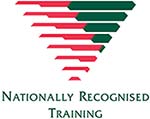• Minimum age requirement: 16
• Must be currently employed and have a Registered Training Agreement with their employer.
Inherent requirements
Our inherent requirements are a guide to help you decide if a course is right for you.
If you are a student with a disability, long-term illness, mental health condition or are a primary carer of an individual with a disability, you can apply for support through our Equitable Learning and Disability Support team.
Physical:
The program consists of aquatic skillsets, which require applicants to be competent swimmers and comfortable in deep water. Candidates will need to actively participate in several simulated rescues demonstrating appropriate fitness, strength efficiency and speed throughout the rescues. Specifically, candidates will need to demonstrate:
• Teamwork to safely and efficiently extract both conscious and unconscious casualties from deep and shallow water.
• Contact and non-contract tows of casualties in a range of distances.
• Swim 25 metres and retrieve a submerged object replicating a person from the greatest depth of the facility but no greater than 2 metres in depth and extract the unconscious casualty at least 25 metres to safety.
• perform at least 2 minutes of uninterrupted single rescuer cardiopulmonary resuscitation (CPR) (5 cycles of both compressions and ventilations) on an adult resuscitation manikin placed on the floor.
As a minimum, it is recommended candidates be able to swim 200 metres unassisted in under 6 minutes. Applicants are encouraged to test themselves against these benchmarks prior to undertaking the skillset training.
Cognitive/Emotional:
Being a pool lifeguard requires not just physical fitness and technical skills but also the ability to manage various
emotional challenges. The emotional inherent requirements for pool lifeguards include:
• Emotional Resilience: Lifeguards must be able to stay calm and composed in high-pressure situations, such as during a rescue or medical emergency. They need to manage their emotions effectively to make quick, rational decisions.
• Vigilance and Focus: Lifeguards are required to maintain constant focus on the pool area, often for extended periods. This
requires a high level of mental stamina and the ability to avoid distractions while on duty.
• Empathy and Compassion: Lifeguards often interact with pool guests, and young people, some of whom may be in distress or in need of assistance. Showing empathy and compassion while maintaining professionalism is essential.
• Stress Management: The role can be stressful, especially when dealing with life-and-death situations. Lifeguards need to manage stress in a way that does not impair their performance or well-being.
• Conflict Resolution: Lifeguards may need to manage conflicts or enforce pool rules, requiring them to handle these situations with assertiveness and emotional control.
• Adaptability: Lifeguards must be adaptable and able to respond to unpredictable situations, whether it’s a sudden emergency or dealing with challenging behaviour from guests.
•Confidence and Assertiveness: Making quick decisions and taking control in emergencies requires confidence and the
assertiveness to direct others as needed.
• Emotional Intelligence: Understanding and managing your own emotions, as well as recognising and responding appropriately to the emotions of others.
Experience:
The program is a traineeship model and students will need to be employed at an Aquatic Facility, and it is recommended
they have completed their probationary period with their registered employer.
Students must have basic to intermediate digital literacy skills using programs such as but not limited to the Microsoft Office Suite. Must be proficient using emails and navigating the internet and have access to a computer.
Industry:
Strong communication skills are required within the Aquatic Industry; students must be comfortable engaging and
communicating with members of the public.
Language, literacy and numeracy
You are required to complete a language, literacy and numeracy skills test before course commencement. This will determine course suitability and if you may need additional support.
We use an approved online skills review tool to determine your language, literacy and numeracy skills within the Australian Core Skills Framework (ACSF).
Below are the levels required for this course:
• Language and literacy: 3
• Numeracy: 3
 Chisholm is a Registered Training Organisation (RTO) and provides Nationally Recognised Training (NRT). This means you can be assured that our training will provide you with a qualification that is recognised and respected across Australia.
Chisholm is a Registered Training Organisation (RTO) and provides Nationally Recognised Training (NRT). This means you can be assured that our training will provide you with a qualification that is recognised and respected across Australia.
